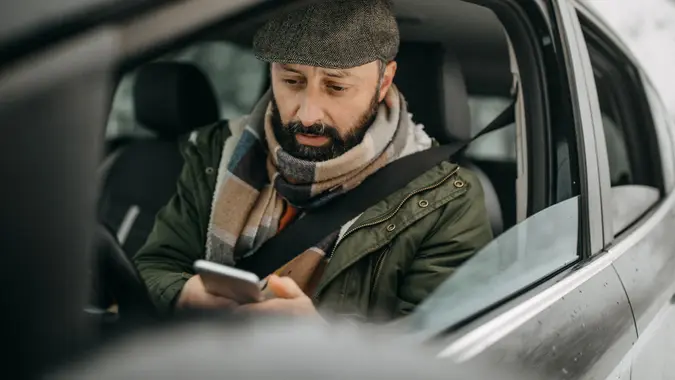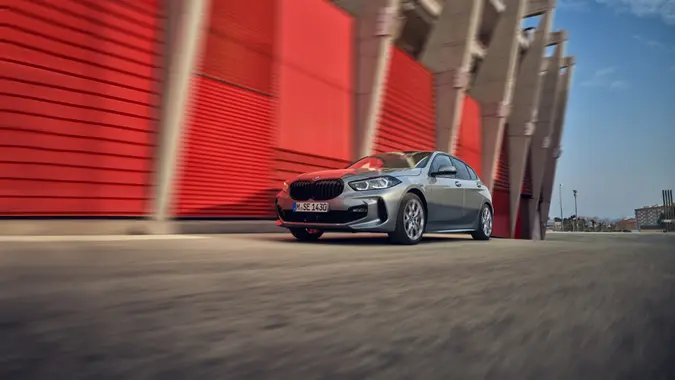How To Buy Your First Car: Step-by-Step Guide

Commitment to Our Readers
GOBankingRates' editorial team is committed to bringing you unbiased reviews and information. We use data-driven methodologies to evaluate financial products and services - our reviews and ratings are not influenced by advertisers. You can read more about our editorial guidelines and our products and services review methodology.

20 Years
Helping You Live Richer

Reviewed
by Experts

Trusted by
Millions of Readers
Buying a car is the largest purchase people typically make besides buying a house. If you do your research and prepare yourself, the car-buying process can be a stress-free experience. And if you stick to a budget and look for the best deals, you might even save some money when you buy your car. Here’s a guide on how to buy your first car.
How To Buy Your First Car: 8-Step Guide
Are you excited to buy your first car? It is good to have a plan in place. Check out this step-by-step guide to buying your first car.
1. Set a Budget
Do you know your budget for a new car? Crunch the numbers to see how much you can spend on the vehicle, registration, tax and title and insurance.
Don’t forget to factor in maintenance fees for routine oil changes and emergencies.
Once you have a number, consider whether you want to finance the car, pay cash or lease. If you plan to pay monthly, remember to include it in your budget.
2. Decide Between a New or Used Car
Are you looking for a new or used car? Consider what works best for your budget and how long you may want to keep the vehicle. Cost may be a deciding factor.
- New vehicles come with warranties and the latest features, but remember, each “extra” will hit your bottom line.
- A used car may be more affordable but may require more maintenance. You may have to take it to the auto shop more often than a new car.
Good To Know
If you’re torn between buying new or used, a certified pre-owned vehicle could be the perfect middle ground.
CPO cars typically cost less than new ones but offer added reliability, extended warranties and thorough inspections — giving you peace of mind without the high price tag.
3. Research and Compare Cars
Before choosing a car, consider the following factors to find the right fit:
- Set your budget: Review your finances to understand what price range you can afford. You might also consider whether a used car makes more sense than a new one.
- Match the car to your lifestyle:
- Do you need a fuel-efficient commuter car?
- A family-sized SUV?
- Something fit for outdoor activities or road trips?
- Check fuel efficiency: Look at how many miles per gallon the vehicle gets, especially if you drive often or long distances.
- Review safety ratings: Use resources like the National Highway Traffic Safety Administration to compare safety scores.
- Read customer feedback: Read expert reviews to learn about real-world experiences with the car you’re considering.
- Look into the vehicle history (for used cars): Use services like CARFAX to check for accidents, maintenance reports and ownership history.
4. Explore Financing Options
You will need to evaluate which financing option works best for you.
- If you have a substantial amount of savings, you can avoid interest by paying with cash.
- A second option is to get a loan to pay for the vehicle. It will require a credit check, and you will have to provide a down payment.
- If paying with cash or getting a loan doesn’t work for you, you can always consider leasing. Leasing allows a lower monthly payment. The tradeoff is that you have to comply with mileage limits.
5. Get Preapproved for a Loan
To demonstrate to the dealer you are a serious buyer, try to get preapproved for a loan. You may receive a lower interest rate if you get preapproved.
Make sure that you compare rates from other banks, credit unions and online lenders.
6. Test Drive and Inspect the Car
When you find a vehicle you’re seriously interested in buying, it’s time to take a test drive. Here are some tips to keep in mind:
- Bring a friend or family member along on the drive — they may notice things that you don’t.
- Check the interior and exterior for damage.
- Make sure you drive in the traffic conditions you typically experience. For instance, if you know you sit in stop-and-go traffic, see what it’s like in the car you choose.
- If you can, test drive the car on the freeway to see how it runs at full speed.
Pro Tip
If you decide to buy a used car, in addition to the test drive, consider getting a mechanic’s inspection before buying the vehicle.
7. Negotiate the Price
With public resources like Kelly Blue Book or Edmunds, you can research the fair market value for your car’s make and model.
When you’re negotiating the car price, don’t be afraid to lowball your initial price to determine how the dealer will react. If the price is too high, don’t be afraid to walk away.
You aren’t just paying for the asking price of the car. Make sure you ask about tax, title and registration, as well as dealer fees, warranties and add-ons.
8. Review the Paperwork and Close the Deal
Read the fine print of your sales contract, financing terms and warranty details carefully. Check and double-check that these are the terms that you agreed to during the negotiation.
Once you close the deal, make sure you receive a title, bill of sale and any warranty paperwork.
New Car vs. Used Car: How To Decide
How do you decide between a new vs. a used car? Take a look at this table to help you make this decision:
| Feature | New Car | Used Car |
|---|---|---|
| Price | High upfront cost | Lower purchase price |
| Depreciation | Significant drop | Slower drop after first few years |
| Warranty | Full manufacturer warranty | Expired or limited |
| Reliability | More reliable | Based on condition and age |
| Financing Rates | Lower interest rates | Higher interest rates |
| Insurance Costs | Higher | Lower |
| Vehicle History | None, brand new vehicle | Check for accident/repairs |
| Registration and Fees | Higher registration and taxes | Lower fees in most states |
| Long-Term Value | Loses value quickly | Better value per dollar |
Pros and Cons of Buying Your First Car
Want to know the pros and cons of buying your first car? Here is a list so you can evaluate the advantages and disadvantages of buying your first car:
Pros
- You have freedom to go where you want. Going to work, running errands and meeting with friends becomes easier with your own transportation.
- Builds credit if financing. If you want to slowly build your credit, especially if you have little or no credit history, financing a car will help solidify your credit (if your payments are timely).
- Can be an investment if chosen wisely. If you buy the right car, it may retain its value, or alternatively if you buy a fuel-efficient car, you may get federal or state tax credits.
Cons
- Monthly payments and maintenance costs add up. With a new car, you have to budget for a monthly payment. During certain periods you may have to pay maintenance fees.
- Insurance costs can be high for first-time buyers. If you have never owned a car and are seeking insurance, the cost may be higher since you have no insurance history.
- Depreciation reduces resale value over time. A new car depreciates once you drive it off the parking lot, and the resale value is substantially lower.
4 Tips for First-Time Car Buyers
You may want to keep these tips in mind when you buy a new car:
- Don’t get tempted to buy a car that you cannot afford. Check your finances and analyze your budget before shopping for a vehicle.
- Check into insurance quotes. Get estimates on the cost of car insurance for your potential vehicle.
- Be careful regarding dealership financing. Dealership financing can have high interest rates. Do some comparison shopping before you get the loan at the dealership.
- Always get a used car inspected before buying. Have a few mechanics check out your used car before making the purchase.
Final Thoughts: Making a Smart First Car Purchase
If you’re planning on buying a new car, you want to be sure to plan your budget. Explore new and used car options. Once you decide on a car, take your time to do your research and test-drive the vehicle. Use negotiation skills to get an ideal price and favorable financing terms.
FAQ
Here are the answers to some of the most frequently asked questions about buying a new car.- What is the best first car for a new driver?
- You should look for a car that is safe, reliable, and has low insurance costs. Some options may include a Honda Civic, Toyota Corolla or a Mazda3.
- How much should I spend on my first car?
- Take a look at your monthly budget to see what you can afford.
- If you're paying cash, you should spend no more than 15% of your annual income.
- If you're financing, keep your monthly payment at no more than 10% of your take-home pay.
- Should I buy from a dealership or a private seller?
- This depends on your individual situation. A dealer has financing options and lemon law protections, while a private seller will likely sell the car at a lower cost and be willing to negotiate.
- Is it better to finance or pay cash for my first car?
- Paying cash is always better because you can avoid having to pay interest. However, you need to evaluate your finances before deciding to pay cash. It may be better to finance if you wipe out a substantial amount of your savings to pay cash for your car.
- How do I know if a used car is reliable?
- Check the vehicle history report through CARFAX, have a mechanic inspect the car and look up reliability ratings on Consumer Reports.
 Written by
Written by  Edited by
Edited by 

























